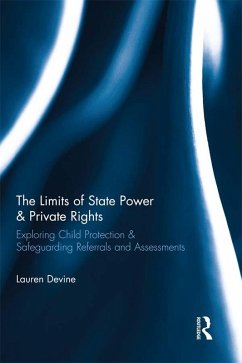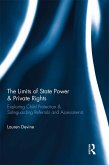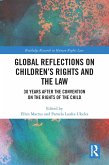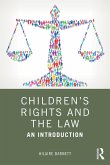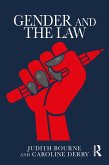Lauren Devine
The Limits of State Power & Private Rights (eBook, ePUB)
Exploring Child Protection & Safeguarding Referrals and Assessments
46,95 €
46,95 €
inkl. MwSt.
Sofort per Download lieferbar

23 °P sammeln
46,95 €
Als Download kaufen

46,95 €
inkl. MwSt.
Sofort per Download lieferbar

23 °P sammeln
Jetzt verschenken
Alle Infos zum eBook verschenken
46,95 €
inkl. MwSt.
Sofort per Download lieferbar
Alle Infos zum eBook verschenken

23 °P sammeln
Lauren Devine
The Limits of State Power & Private Rights (eBook, ePUB)
Exploring Child Protection & Safeguarding Referrals and Assessments
- Format: ePub
- Merkliste
- Auf die Merkliste
- Bewerten Bewerten
- Teilen
- Produkt teilen
- Produkterinnerung
- Produkterinnerung

Bitte loggen Sie sich zunächst in Ihr Kundenkonto ein oder registrieren Sie sich bei
bücher.de, um das eBook-Abo tolino select nutzen zu können.
Hier können Sie sich einloggen
Hier können Sie sich einloggen
Sie sind bereits eingeloggt. Klicken Sie auf 2. tolino select Abo, um fortzufahren.

Bitte loggen Sie sich zunächst in Ihr Kundenkonto ein oder registrieren Sie sich bei bücher.de, um das eBook-Abo tolino select nutzen zu können.
The Limits of State Power & Private Rights: Exploring Child Protection & Safeguarding Referrals and Assessments examines in detail the UK child protection and safeguarding system, exploring its theoretical and legal basis and implications in modern society.
- Geräte: eReader
- mit Kopierschutz
- eBook Hilfe
- Größe: 1.6MB
Andere Kunden interessierten sich auch für
![The Limits of State Power & Private Rights (eBook, PDF) The Limits of State Power & Private Rights (eBook, PDF)]() Lauren DevineThe Limits of State Power & Private Rights (eBook, PDF)46,95 €
Lauren DevineThe Limits of State Power & Private Rights (eBook, PDF)46,95 €![Global Reflections on Children's Rights and the Law (eBook, ePUB) Global Reflections on Children's Rights and the Law (eBook, ePUB)]() Global Reflections on Children's Rights and the Law (eBook, ePUB)40,95 €
Global Reflections on Children's Rights and the Law (eBook, ePUB)40,95 €![Children's Rights and the Law (eBook, ePUB) Children's Rights and the Law (eBook, ePUB)]() Hilaire BarnettChildren's Rights and the Law (eBook, ePUB)39,95 €
Hilaire BarnettChildren's Rights and the Law (eBook, ePUB)39,95 €![From Civil Partnership to Same-Sex Marriage (eBook, ePUB) From Civil Partnership to Same-Sex Marriage (eBook, ePUB)]() From Civil Partnership to Same-Sex Marriage (eBook, ePUB)50,95 €
From Civil Partnership to Same-Sex Marriage (eBook, ePUB)50,95 €![Social Rights in the Welfare State (eBook, ePUB) Social Rights in the Welfare State (eBook, ePUB)]() Social Rights in the Welfare State (eBook, ePUB)46,95 €
Social Rights in the Welfare State (eBook, ePUB)46,95 €![Intimate Lies and the Law (eBook, ePUB) Intimate Lies and the Law (eBook, ePUB)]() Jill Elaine HasdayIntimate Lies and the Law (eBook, ePUB)13,95 €
Jill Elaine HasdayIntimate Lies and the Law (eBook, ePUB)13,95 €![Gender and the Law (eBook, ePUB) Gender and the Law (eBook, ePUB)]() Judith BourneGender and the Law (eBook, ePUB)39,95 €
Judith BourneGender and the Law (eBook, ePUB)39,95 €-
-
-
The Limits of State Power & Private Rights: Exploring Child Protection & Safeguarding Referrals and Assessments examines in detail the UK child protection and safeguarding system, exploring its theoretical and legal basis and implications in modern society.
Dieser Download kann aus rechtlichen Gründen nur mit Rechnungsadresse in A, B, BG, CY, CZ, D, DK, EW, E, FIN, F, GR, HR, H, IRL, I, LT, L, LR, M, NL, PL, P, R, S, SLO, SK ausgeliefert werden.
Produktdetails
- Produktdetails
- Verlag: Taylor & Francis eBooks
- Seitenzahl: 225
- Erscheinungstermin: 16. März 2017
- Englisch
- ISBN-13: 9781317662259
- Artikelnr.: 48417900
- Verlag: Taylor & Francis eBooks
- Seitenzahl: 225
- Erscheinungstermin: 16. März 2017
- Englisch
- ISBN-13: 9781317662259
- Artikelnr.: 48417900
- Herstellerkennzeichnung Die Herstellerinformationen sind derzeit nicht verfügbar.
Dr Lauren Devine, Associate Professor of Law, University of the West of England, Bristol, UK is a Barrister writing about State power, private rights and child protection. Lauren is Principal Investigator of the Economic and Social Research Council funded project 'Rethinking Child Protection Strategy'.
Introduction
Exploring the issue: State power and private rights
Central themes and structure of the book
Chapter 1 - Development of the State's role: child welfare & family
policing
The State's developing role in children's welfare: good intentions and
opposing narratives
The development of child welfare principles
The development of State principles for the protection of children
Moving from parental autonomy to parental responsibility
The refocusing debate
Safeguarding and early intervention
Conclusion: the modern categorisation of levels of surveillance and
interference
Chapter 2 - Defining and measuring the problem
Defining child abuse
Issues of measuring the prevalence of, and predicting, child abuse
Prevalence: measuring of the amount of child abuse in England
Measuring the outcome
Risk prediction: can child abuse be predicted and prevented?
Conclusion: issues of measuring success
Chapter 3 - Identifying families for policing
The modern surveillance role of the state: identifying children for
referral
Introducing mass surveillance and recording of information about children:
part of the e-Government agenda
Policing by surveillance of all families: intelligence gathering and its
limits
Conclusion: the challenge of balancing consent and coercion in the
surveillance framework
Chapter 4 - The policing of parents: social work involvement
Social work response to referrals: State power and private rights
The framework of assessment
The Munro review of child protection: final report, a child centred system
and changes to Working Together to Safeguard Children
The Public Law Outline 2014
The process of assessment
Consensual assessment
Coercive assessment
Conclusion: issues of safeguards and controls over State powers of
assessment
Chapter 5 - Paradigms, policy & policing
Smith's schema: exploring the 'fractured lens'
The stages of the assessment procedures in 'child protection' and
'safeguarding' schema
Conclusion: implications for assessment
Chapter 6 - The balance of State power and private rights: considering
protections for children and parents
Moving from 'ownership' to 'responsibility': disowned children and the
burden of policing parental responsibility
What is the legal and policy framework of 'child protection' and
'safeguarding' trying to achieve?
By what mechanisms is the legislative and policy framework trying to
achieve its purpose?
The issue of families harmed by State surveillance and assessment
Defining harm
Unsubstantiated allegations and unfounded concerns
Conclusion: power imbalance and individual harm
Chapter 7 - The question of remedies
Complaints procedures and Judicial Review
Defamation
The European Convention on Human Rights 1950 and the Human Rights Act 1998
Common law negligence
Conclusion: remedies - an inadequate position
Chapter 8 - Reforming policy: the politics of change
The question of reform
Framework for a new approach
Privacy, data and consent: taking the Anderson recommendations seriously
Referrals: improving methods of making and recording referrals
Assessments: a bespoke investigatory body and code of practice
Outcomes: issues of exoneration and redress in unsubstantiated cases
Specific remedies in unsubstantiated cases
Conclusion: rebalancing - the basis for reform
Conclusion
Index
Exploring the issue: State power and private rights
Central themes and structure of the book
Chapter 1 - Development of the State's role: child welfare & family
policing
The State's developing role in children's welfare: good intentions and
opposing narratives
The development of child welfare principles
The development of State principles for the protection of children
Moving from parental autonomy to parental responsibility
The refocusing debate
Safeguarding and early intervention
Conclusion: the modern categorisation of levels of surveillance and
interference
Chapter 2 - Defining and measuring the problem
Defining child abuse
Issues of measuring the prevalence of, and predicting, child abuse
Prevalence: measuring of the amount of child abuse in England
Measuring the outcome
Risk prediction: can child abuse be predicted and prevented?
Conclusion: issues of measuring success
Chapter 3 - Identifying families for policing
The modern surveillance role of the state: identifying children for
referral
Introducing mass surveillance and recording of information about children:
part of the e-Government agenda
Policing by surveillance of all families: intelligence gathering and its
limits
Conclusion: the challenge of balancing consent and coercion in the
surveillance framework
Chapter 4 - The policing of parents: social work involvement
Social work response to referrals: State power and private rights
The framework of assessment
The Munro review of child protection: final report, a child centred system
and changes to Working Together to Safeguard Children
The Public Law Outline 2014
The process of assessment
Consensual assessment
Coercive assessment
Conclusion: issues of safeguards and controls over State powers of
assessment
Chapter 5 - Paradigms, policy & policing
Smith's schema: exploring the 'fractured lens'
The stages of the assessment procedures in 'child protection' and
'safeguarding' schema
Conclusion: implications for assessment
Chapter 6 - The balance of State power and private rights: considering
protections for children and parents
Moving from 'ownership' to 'responsibility': disowned children and the
burden of policing parental responsibility
What is the legal and policy framework of 'child protection' and
'safeguarding' trying to achieve?
By what mechanisms is the legislative and policy framework trying to
achieve its purpose?
The issue of families harmed by State surveillance and assessment
Defining harm
Unsubstantiated allegations and unfounded concerns
Conclusion: power imbalance and individual harm
Chapter 7 - The question of remedies
Complaints procedures and Judicial Review
Defamation
The European Convention on Human Rights 1950 and the Human Rights Act 1998
Common law negligence
Conclusion: remedies - an inadequate position
Chapter 8 - Reforming policy: the politics of change
The question of reform
Framework for a new approach
Privacy, data and consent: taking the Anderson recommendations seriously
Referrals: improving methods of making and recording referrals
Assessments: a bespoke investigatory body and code of practice
Outcomes: issues of exoneration and redress in unsubstantiated cases
Specific remedies in unsubstantiated cases
Conclusion: rebalancing - the basis for reform
Conclusion
Index
Introduction
Exploring the issue: State power and private rights
Central themes and structure of the book
Chapter 1 - Development of the State's role: child welfare & family
policing
The State's developing role in children's welfare: good intentions and
opposing narratives
The development of child welfare principles
The development of State principles for the protection of children
Moving from parental autonomy to parental responsibility
The refocusing debate
Safeguarding and early intervention
Conclusion: the modern categorisation of levels of surveillance and
interference
Chapter 2 - Defining and measuring the problem
Defining child abuse
Issues of measuring the prevalence of, and predicting, child abuse
Prevalence: measuring of the amount of child abuse in England
Measuring the outcome
Risk prediction: can child abuse be predicted and prevented?
Conclusion: issues of measuring success
Chapter 3 - Identifying families for policing
The modern surveillance role of the state: identifying children for
referral
Introducing mass surveillance and recording of information about children:
part of the e-Government agenda
Policing by surveillance of all families: intelligence gathering and its
limits
Conclusion: the challenge of balancing consent and coercion in the
surveillance framework
Chapter 4 - The policing of parents: social work involvement
Social work response to referrals: State power and private rights
The framework of assessment
The Munro review of child protection: final report, a child centred system
and changes to Working Together to Safeguard Children
The Public Law Outline 2014
The process of assessment
Consensual assessment
Coercive assessment
Conclusion: issues of safeguards and controls over State powers of
assessment
Chapter 5 - Paradigms, policy & policing
Smith's schema: exploring the 'fractured lens'
The stages of the assessment procedures in 'child protection' and
'safeguarding' schema
Conclusion: implications for assessment
Chapter 6 - The balance of State power and private rights: considering
protections for children and parents
Moving from 'ownership' to 'responsibility': disowned children and the
burden of policing parental responsibility
What is the legal and policy framework of 'child protection' and
'safeguarding' trying to achieve?
By what mechanisms is the legislative and policy framework trying to
achieve its purpose?
The issue of families harmed by State surveillance and assessment
Defining harm
Unsubstantiated allegations and unfounded concerns
Conclusion: power imbalance and individual harm
Chapter 7 - The question of remedies
Complaints procedures and Judicial Review
Defamation
The European Convention on Human Rights 1950 and the Human Rights Act 1998
Common law negligence
Conclusion: remedies - an inadequate position
Chapter 8 - Reforming policy: the politics of change
The question of reform
Framework for a new approach
Privacy, data and consent: taking the Anderson recommendations seriously
Referrals: improving methods of making and recording referrals
Assessments: a bespoke investigatory body and code of practice
Outcomes: issues of exoneration and redress in unsubstantiated cases
Specific remedies in unsubstantiated cases
Conclusion: rebalancing - the basis for reform
Conclusion
Index
Exploring the issue: State power and private rights
Central themes and structure of the book
Chapter 1 - Development of the State's role: child welfare & family
policing
The State's developing role in children's welfare: good intentions and
opposing narratives
The development of child welfare principles
The development of State principles for the protection of children
Moving from parental autonomy to parental responsibility
The refocusing debate
Safeguarding and early intervention
Conclusion: the modern categorisation of levels of surveillance and
interference
Chapter 2 - Defining and measuring the problem
Defining child abuse
Issues of measuring the prevalence of, and predicting, child abuse
Prevalence: measuring of the amount of child abuse in England
Measuring the outcome
Risk prediction: can child abuse be predicted and prevented?
Conclusion: issues of measuring success
Chapter 3 - Identifying families for policing
The modern surveillance role of the state: identifying children for
referral
Introducing mass surveillance and recording of information about children:
part of the e-Government agenda
Policing by surveillance of all families: intelligence gathering and its
limits
Conclusion: the challenge of balancing consent and coercion in the
surveillance framework
Chapter 4 - The policing of parents: social work involvement
Social work response to referrals: State power and private rights
The framework of assessment
The Munro review of child protection: final report, a child centred system
and changes to Working Together to Safeguard Children
The Public Law Outline 2014
The process of assessment
Consensual assessment
Coercive assessment
Conclusion: issues of safeguards and controls over State powers of
assessment
Chapter 5 - Paradigms, policy & policing
Smith's schema: exploring the 'fractured lens'
The stages of the assessment procedures in 'child protection' and
'safeguarding' schema
Conclusion: implications for assessment
Chapter 6 - The balance of State power and private rights: considering
protections for children and parents
Moving from 'ownership' to 'responsibility': disowned children and the
burden of policing parental responsibility
What is the legal and policy framework of 'child protection' and
'safeguarding' trying to achieve?
By what mechanisms is the legislative and policy framework trying to
achieve its purpose?
The issue of families harmed by State surveillance and assessment
Defining harm
Unsubstantiated allegations and unfounded concerns
Conclusion: power imbalance and individual harm
Chapter 7 - The question of remedies
Complaints procedures and Judicial Review
Defamation
The European Convention on Human Rights 1950 and the Human Rights Act 1998
Common law negligence
Conclusion: remedies - an inadequate position
Chapter 8 - Reforming policy: the politics of change
The question of reform
Framework for a new approach
Privacy, data and consent: taking the Anderson recommendations seriously
Referrals: improving methods of making and recording referrals
Assessments: a bespoke investigatory body and code of practice
Outcomes: issues of exoneration and redress in unsubstantiated cases
Specific remedies in unsubstantiated cases
Conclusion: rebalancing - the basis for reform
Conclusion
Index
